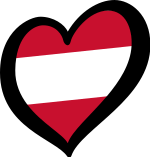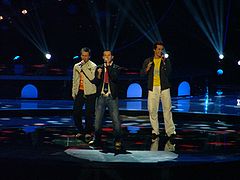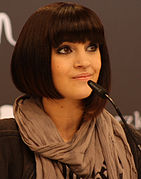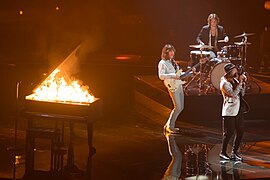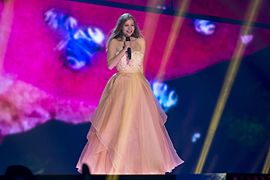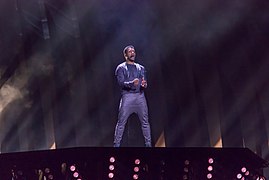Austria at the Eurovision Song Contest
- Broadcasting company

- First participation
- 1957
- Number of participations
- 52 (as of 2019)
- Highest ranking
- 1 ( 1966 , 2014 )
- Highest Score
- 342 ( 2018 )
- Lowest Score
- 0 ( 1962 , 1988 , 1991 , 2015 )
- Points average (since first post)
- 44.88 (as of 2019)
- Average points per voting country in the 12-point system
- 1.75 (as of 2019)
This article deals with the history of Austria as a participant in the Eurovision Song Contest .
Regularity of participation and successes in competition
Austria first took part in the Eurovision Song Contest in Frankfurt am Main in 1957 . It was only the second edition of the competition, which was then called the Grand Prix Eurovision de la Chanson . There the singer Bob Martin represented the country, but ended up with his song Wohin, kleine Pony? in last place with three points. Despite the low success in the previous year, the country also took part in 1958. There the singer Liane Augustin reached 5th place. In the following years Austria continued to participate, but could not record any great successes. The contributions from 1959 and 1960 placed 9th and 7th respectively. In 1961 and 1962, only the last place was reached, which was shared with other countries. In 1962 the contribution did not even receive a point. Austria's first successes in the competition only began in 1963.
In 1963, the singer Carmela Corren finished 7th out of 16 and ended up in the middle of the field. In 1964, the singer Udo Jürgens even reached 6th place. In 1965 too, Jürgens represented the state in the competition and, with 4th place, achieved the state's best position in the competition to date. After this success, Jürgens also represented Austria in 1966 and was again able to improve his ranking from the previous year. With his song Merci, Chérie Austria's first victory in the competition, he was only the third participant to take part three times in a row and at least one Win. In 1967 the competition took place for the first time in Austria and thus in Vienna. However, Udo Juergens' successes could not be continued and the singer Peter Horton only reached 14th place out of 17. Also in 1968 only a similar placement was achieved with 13th place. In 1969 in Madrid Austria boycotted the competition, as the country of the Franco dictatorship did not Wanted to offer a platform. In 1970 Austria refrained from participating together with Finland , Norway , Portugal and Sweden because of dissatisfaction with the circumstances and voting mechanisms of last year's event after four countries had been chosen as winners in Spain in 1969. Austria did not return to the competition until 1971.
In 1971, after a two-year absence, the country was again unable to achieve a good ranking. The Austrian contribution in 1971 only came third from the bottom. In 1972, however, the band Milestones took 5th place and with 100 points Austria achieved the highest number of points in the competition. Despite this success, Austria refrained from participating from 1973 to 1975 out of disinterest. In 1976 the country returned and was able to repeat its placement from 1972 with 5th place. After that, Austria often achieved very different placements. In 1977 only the last place in the competition was achieved, in 1978 the band Springtime reached place 15 and in 1979 the singer Christina Simon landed on a shared last place. In 1980, 8th place was reached, in 1981, however, only 17th place again. 1982 and 1983 were then 9th place each, followed by last place in 1984. By then, it was the fifth time that Austria came last in the competition. Otherwise, the successes remained manageable until 1988. In 1985, a good ranking was achieved with 8th place, but the country was only third from bottom in 1986 and 1987. In 1988 the last place was reached again, but this time with zero points. It wasn't until 1989 that there was a better placement in the competition.
In 1989, the song Nur ein Lied, performed by Thomas Forstner, achieved 5th place, the best ranking in Austria for 13 years. In 1990 the country achieved another placement in the top ten with 10th place. In 1991, however, another last place followed, the seventh last place in Austria's Songcontet history. In 1992 the singer Tony Wegas represented the country and got a good place with 10th place. In 1993 the singer also represented the country and ended up in the midfield with 14th place. In 1994 and 1995 Austria achieved placements in the middle of the field with 17th and 13th place. In 1996 it was again tenth, but in 1997 the Austrian contribution only reached 21st place. Due to the poor ranking, no contribution could be submitted in 1998. In 1999, the ORF was allowed to submit a contribution again and took another tenth place. In 2000, a position in the middle of the field was achieved again with 14th place, from which 2001 again no contribution could be submitted. In 2002 the country was allowed to participate again, but did not get a good place with 18th place either. In 2003, on the other hand, Austria sent Alf Poier with the song Because man counts and thus took 6th place, which was Austria's best result in 12 years. With 101 points Poier even topped the highest number of points from the band Milestones from 1972. However, the success ended in 2004 when the band Tie Break reached number 21. Due to the poor position in the previous year, the country then had to take part in the semi-finals introduced in the previous year for the first time in 2005. The band Global Kryner reached with the song Y así but only place 21 of 25 in the semifinals and thus clearly missed the final. In 2006 Austria withdrew from the competition. Due to poor chances of success and criticism of the musical quality, participation was waived. The then program director of ORF Reinhard Scolik said: In the meantime, this event has [...] become a bizarre competition that is completely irrelevant for the local music scene. Nevertheless, the country took part again a year later, but the singer Eric Papilaya only reached the penultimate place in the semi-finals and Austria was again clearly eliminated. In 2008 Austria did not submit a contribution again. The reason given was the unequal chances of the western and eastern European countries. In September 2008 it was announced that Austria would not participate in 2009 for these reasons. Participation was also canceled in 2010 because, from the point of view of ORF program director Wolfgang Lorenz, the chances of winning had been "ruined" by the new rules, and participation was too expensive for ORF. In 2011 Austria returned to the competition after a three-year break and from then on had its most successful phase in the competition.
In 2011 a preliminary decision was held for the first time since 2005. In the end, Nadine Beiler won this with her song The Secret is Love . Beiler then reached 7th place in the semifinals in Düsseldorf and thus brought Austria into a final for the first time via a semifinal. It was also Austria's first participation in the finals in seven years. In the final, Beiler landed in midfield with 18th place. In 2012 and 2013 Austria clearly missed the final, because in 2012 the duo Trackshittaz only reached the last place in the semifinals, while the singer Natália Kelly only got the third from last place in the semifinals. Despite these two less successful years, Austria also took part in the song contest in 2014. There, the ORF then decided to carry out an internal selection and selected Conchita Wurst . Her song Rise Like a Phoenix then successfully qualified for the finals, making the country the first time in three years to take part in the finals. That was where the great success came: Conchita Wurst won the competition in Copenhagen and thus brought Austria's first victory in 48 years. With 290 points she also got a new high score for the country. Accordingly, the 2015 competition took place in Austria for the first time since 1967, again in Vienna. But as in 1967, the country was again not very successful as a host. So the band The Makemakes did not receive a point and ended up in last place with Germany. Due to the better start number, Austria is marked as the penultimate place. It was also the first and so far only time that the host's contribution did not receive a point. In 2016 the singer Zoë should achieve a better result and successfully qualified for the final. With 13th place she got a placement in the upper midfield. Also in 2017 the singer Nathan Trent managed to reach the final, where he reached number 17. In 2018 the singer Cesár Sampson represented Austria with the song Nobody but You . He also brought Austria to the final, with Austria taking part in the final five times in a row. Most recently, Austria took part in the final so many times in a row in the mid-1990s. In the end, Sampson won the jury voting in Lisbon and, in combination with the televoting, achieved third place and thus Austria's third best result in the competition. With 342 points, Sampson also scored a new high for Austria. With the exception of Udo Jürgens in 1966, Austria achieved its greatest successes in competition within four years. However, this successful period ended in 2019.
So the singer PÆNDA missed the final, as she only occupied the penultimate place in the semifinals. It was the first time since 2013 that Austria did not qualify for the final.
In total, 20 of the 52 entries ended up in the left half of the table. Austria came in last nine times and is in third place in the list of the most frequent last places together with Switzerland. Only Norway and Finland are more often (eleven times) in last place. In addition, Austria has so far achieved zero points four times in the competition and thus most often did not score a point together with Norway and Switzerland. On the other hand, Austria only missed the finals five times. There are also two wins (1966, 2014) and a third place (2018). Overall, Austria is one of the less successful countries in competition.
List of posts
Color legend: - 1st place. - 2nd place. - 3rd place. - Equal points with last place. - Eliminated in the semifinals / in the qualification / in the Eastern European preliminary decision. - no participation / not qualified. - Cancellation of the Eurovision Song Contest.
| year | Interpreter | Title Music (M) and Text (T) |
language | translation | final | Semi-final / qualification |
National preliminary decision |
Charts (AT) |
||
|---|---|---|---|---|---|---|---|---|---|---|
| space | Points | space | Points | |||||||
| 1957 | Bob Martin |
Where to, little pony? M: Kurt Svab; T: Kurt Svab, Hans Werner |
German | - | 10/10 | 3 | Direct participation | internal selection | k. A. | |
| 1958 | Liane Augustin |
The whole world needs love M / T: Günther Leopold, Kurt Werner |
German | - | 5/10 | 8th | internal selection | k. A. | ||
| 1959 | Ferry Graf |
The k. u. k. Kalypso from Vienna M: Norbert Pawlicki ; T: Günther Leopold |
German | - | 9/11 | 4th | internal selection | k. A. | ||
| 1960 | Harry Winter |
You fascinated me so much M: Robert Stolz ; T: Robert Gilbert |
German | - | 7/13 | 6th | internal selection | k. A. | ||
| 1961 | Jimmy Makulis |
Longing M / T: Leopold Andrejewitsch |
German | - | 15/16 | 1 | internal selection | k. A. | ||
| 1962 | Eleanor Black |
Only in the Wiener Luft M / T: Bruno Uher |
German | - | 13/16 | 0 | internal selection | k. A. | ||
| 1963 | Carmela Corren |
Maybe a miracle will happen M: Erwin Halletz ; T: Peter Wehle |
German, English | - | 7/16 | 16 | internal selection | k. A. | ||
| 1964 | Udo Juergens |
Why just why? M / T: Udo Jürgens |
German | - | 6/16 | 11 | internal selection | k. A. | ||
| 1965 | Udo Juergens |
Tell her I send my regards M: Udo Jürgens ; T: Frank Bohlen |
German | - | 4/18 | 16 | internal selection | 4th | ||
| 1966 | Udo Juergens |
Merci, Chérie M: Udo Jürgens ; T: Udo Jürgens, Thomas Hörbiger |
German a. | Thank you sweetheart | 1 /18 | 31 | internal selection | 2 | ||
| 1967 | Peter Horton |
Why there are a hundred thousand stars M: Kurt Peche; T: Karin Bognar |
German | - | 14/17 | 2 | internal selection | - | ||
| 1968 | Karel Gott |
Thousand Windows M: Udo Jürgens ; T: Walter Brandin |
German | - | 13/17 | 2 | internal selection | - | ||
|
1969 1970 |
No participation | |||||||||
| 1971 | Marianne Mendt |
Music M / T: Richard Schönherz , Manuel Rigoni |
German | - | 16/18 | 66 | Direct participation | internal selection | - | |
| 1972 | Milestones |
Falter im Wind M: Richard Schönherz , Manuel Rigoni; T: Heinz Rudolf Unger |
German | - | 5/18 | 100 | internal selection | - | ||
|
1973 1974 1975 |
No participation | |||||||||
| 1976 | Waterloo & Robinson |
My Little World M / T: Gerhard Heinz |
English | My little world | 5/18 | 80 | Direct participation | internal selection | 1 | |
| 1977 | Butterflies |
Boom Boom Boomerang M: Schuri Herrnstadt, Herbert Zöchling-Tampier, Willi Resetarits ; T: Lukas Resetarits |
German b. | - | 17/18 | 11 | internal selection | 10 | ||
| 1978 | Springtime |
Mrs. Caroline Robinson M: Walter Markel , Gerhard Markel ; T: Norbert Niedermayer , Gerhard Markel, Walter Markel |
German | - | 15/20 | 14th | internal selection | - | ||
| 1979 | Christina Simon |
Today in Jerusalem M: Peter Wolf ; T: André Heller |
German | - | 18/19 | 5 | internal selection | - | ||
| 1980 | Blue Danube |
You are music M / T: Klaus-Peter Sattler |
German | - | 8/19 | 64 | internal selection | - | ||
| 1981 | Marty Brem |
When you are there M / T: Werner Böhmler |
German | - | 17/20 | 20th | National preliminary decision | - | ||
| 1982 | Mess |
Sunday M: Michael Mell; T: Rudolf Leve |
German | - | 9/18 | 57 | National preliminary decision | 1 | ||
| 1983 | West end |
Hurricane M: Peter Vieweger; T: Heli Deinboek , Heinz Nessizius |
German | - | 9/20 | 53 | National preliminary decision | 8th | ||
| 1984 | Anita |
Simply away M: Brigitte Seuberth; T: Walter Müller |
German | - | 19/19 | 5 | National preliminary decision | 1 | ||
| 1985 | Gary Lux |
Children of the World M: Mick Jackson, Geoff Bastow; T: Michael Kunze |
German | - | 8/19 | 60 | internal selection | 11 | ||
| 1986 | Timna brewer |
Time is lonely M: Peter Janda; T: Peter Cornelius |
German | - | 18/20 | 12 | internal selection | - | ||
| 1987 | Gary Lux |
Just feeling M: Kenneth Westmore; T: Stefanie Werger |
German | - | 20/22 | 8th | internal selection | - | ||
| 1988 | Wilfried |
Lisa, Mona Lisa M / T: Klaus Kofler, Ronnie Herboltzheimer, Wilfried Scheutz |
German | - | 21/21 | 0 | internal selection | 27 | ||
| 1989 | Thomas Forstner |
Just a song M: Dieter Bohlen ; T: Joachim Horn-Bernges |
German | - | 5/22 | 97 | internal selection | 1 | ||
| 1990 | Simone |
No more walls M: Marc Berry, Nanna Berry; T: Mario Botazzi |
German c. | - | 10/22 | 58 | National preliminary decision | 23 | ||
| 1991 | Thomas Forstner |
Venice in the rain M / T: Robby Musenbichler , Hubert Moser, Wolfgang Eltner |
German | - | 22/22 | 0 | National preliminary decision | 5 | ||
| 1992 | Tony Wegas |
Going together M: Dieter Bohlen ; T: Joachim Horn-Bernges |
German | - | 10/23 | 63 | internal selection | 9 | ||
| 1993 | Tony Wegas |
Maria Magdalena M: Christian Kolonovits , Johann Bertl; T: Thomas Spitzer |
German | - | 14/25 | 32 | National preliminary decision | 26th | ||
| 1994 | Petra Frey |
For the peace of the world M: Alfons Weindorf ; T: Karl and Johann Brunner |
German | - | 17/25 | 19th | Qualified directly for the final | National preliminary decision | - | |
| 1995 | Stella Jones |
The world is turning upside down M / T: Mischa Krausz |
German | - | 13/23 | 67 | internal selection | - | ||
| 1996 | George Nussbaumer |
Because it's good M / T: Mischa Krausz , George Nussbaumer |
Vorarlbergian | Because you are fine | 10/23 | 68 | 6/29 | 80 | internal selection | 36 |
| 1997 | Bettina Soriat |
One Step M: Marc Berry; T: Marc Berry, Martina Siber |
German b. | A step | 21/25 | 12 | Qualified directly for the final | internal selection | - | |
| 1998 | Not qualified | |||||||||
| 1999 | Bobbie Singer |
Reflection M / T: Dave Moskin |
English | reflection | 10/23 | 65 | Qualified directly for the final | internal selection | 30th | |
| 2000 | The Rounder Girls |
All to You M / T: Dave Moskin |
English | Everything to you | 14/24 | 34 | internal selection | - | ||
| 2001 | Not qualified | |||||||||
| 2002 | Manuel Ortega |
Say a Word M: Alexander Kahr ; T: Robert Pfluger |
English | Say a word | 18/24 | 24 | Qualified directly for the final | song.null.two | 11 | |
| 2003 | Alf Poier |
Because people count M / T: Alf Poier |
Styrian | - | 6/26 | 101 | song.null.three | 7th | ||
| 2004 | Tie break |
You are M / T: Peter Zimmermann |
German | - | 21/24 | 9 | song, zero, four | 44 | ||
| 2005 | Global Kryner |
Y así M: Edi Köhldorfer ; T: Christof Spörk |
English Spanish | And so | Eliminated | 21/25 | 30th | song, zero, five | 23 | |
| 2006 | No participation | |||||||||
| 2007 | Eric Papilaya |
Get a Life - Get Alive M: Greg Usek; T: Austin Howard |
English | Begin to live - become alive | Eliminated | 27/28 | 4th | internal selection | 9 | |
|
2008 2009 2010 |
No participation | |||||||||
| 2011 | Nadine Beiler |
The Secret Is Love M / T: Nadine Beiler , Thomas Rabitsch |
English | The secret is love | 18/25 | 64 | 7/19 | 69 | Good morning Düsseldorf | 9 |
| 2012 | Trackshittaz |
Woki with deim Popo M / T: Lukas Plöchl , Manuel Hoffelner |
Austrian German | Wiggle your bottom | Eliminated | 18/18 | 8th | Austria rocks the Song Contest 2012 | 2 | |
| 2013 | Natália Kelly |
Shine M / T: Andreas Grass, Nikola Paryla, Natália Kelly , Alexander Kahr |
English | to shine | Eliminated | 14/16 | 27 | Austria rocks the Song Contest 2013 | 26th | |
| 2014 | Conchita Wurst |
Rise Like a Phoenix M / T: Charly Mason, Joey Patulka, Ali Zuckowski , Julian Maas |
English | Resurrect like a phoenix | 1 / 26th | 290 | 1/15 | 169 | internal selection | 1 |
| 2015 | The Makemakes |
I Am Yours M / T: Jimmy Harry, Dominic Muhrer, Markus Christ, Florian Meindl |
English | I belong to you | 26/27 1 | 0 | Qualified directly for the final | Eurovision Song Contest - Who sings for Austria? | 2 | |
| 2016 | Zoë |
Loin d'ici M / T: Christof Straub , Zoë Straub |
French | Far away from here | 13/26 | 151 | 7/18 | 170 | Eurovision Song Contest - Who sings for Austria? | 13 |
| 2017 | Nathan Trent |
Running on Air M / T: Bernhard Penzias, Nathan Trent |
English | Run on air | 16/26 | 93 | 7/18 | 147 | internal selection | 18th |
| 2018 | Cesár Sampson |
Nobody but You M / T: Cesár Sampson, Sebastian Arman, Joacim Persson, Johan Alkenäs, Borislaw Milanow |
English | No one but you | 3 / 26th | 342 | 4/19 | 231 | internal selection | 1 |
| 2019 | PÆNDA |
Limits M / T: PÆNDA |
English | Limits | Eliminated | 17/18 | 21st | internal selection | - | |
|
|
Vincent Bueno |
Alive M: Vincent Bueno , David "Davey" Yang, Felix van Göns, Artur Aigner; T: Vincent Bueno |
English | Lively |
Cancellation due to the COVID-19 pandemic by the EBU |
internal selection | - | |||
| 2021 | Vincent Bueno | internal selection | ||||||||
National preliminary decisions
In most years, the Austrian contributions were selected internally: 1957 to 1980, 1985 to 1989, 1992, 1995 to 2000, 2007, 2014 and since 2017. In the other years, national preliminary rounds were held on television, with the ORF using various selection procedures :
1981
The first ever Austrian qualification took place in 1981. It turned out to be relatively small: Marty Brem presented all three songs before the audience could vote for their favorite by postcard .
1982 to 1984
Between 1982 and 1984 twelve songs by different artists were presented in the preliminary round. The winner was determined through a public survey.
1990 and 1991
In 1990 and 1991 ten songs each were presented, voting was carried out by means of a jury and telephone voting. In 1990, the group Duett with the singer Monika Sutter originally won the preliminary round with the song Das Beste . Shortly after the broadcast, however, it turned out that the title had already taken part in the radio semi-finals in Germany in 1988 and was therefore disqualified. Simone, the runner-up, was therefore allowed to go to Zagreb .
1993
In 1993 Tony Wegas presented all seven songs of the preliminary decision before the audience could vote again by postcard.
1994
The following year eight artists took part, each with a title, and a jury alone chose the winner.
2002 to 2005
In the years 2002 to 2004 the Austrian qualification took place under the title song.null. ... (supplemented by the respective year). In all years there were ten songs to choose from, whereby from 2002 to 2004 each artist had one song, but in 2005 five singers and groups each presented two titles. The voting mechanism changed: in 2002 the televoting was carried out by an internet jury made up of the winners of a competition, in 2003 the telephone voting was divided into female and male callers. In 2005 the callers were divided into the nine federal states and a fictitious tenth federal state, which counted all calls made by mobile phone . The voting process was heavily criticized because every federal state, regardless of its number of inhabitants, as well as the cell phone callers, had the same voting rights, which means that the vote was postponed in favor of rural regions and the elderly. In fact, it turned out in retrospect that the second-placed Alf Poier had received 106,100 calls, 45,000 votes more than the winner Global Kryner.
2011
→ see Good morning Düsseldorf
Between the end of 2010 and the beginning of 2011, ORF television and Ö3 held a preliminary decision for the Eurovision Song Contest for the first time since 2005. The Austrian contribution to the Song Contest in Düsseldorf was determined in three phases. From autumn to New Year's Eve 2010, every singer could nominate his or her song on the ORF website.
A jury shortened the number of participants to 30. From January 3rd to 31st you could vote for your favorite by SMS. The top 10 was decided by a combination of SMS voting and the jury. On February 25th, first the top 3 and then the winner was chosen by televoting.
2012
The Austrian Broadcasting Organization organized the preliminary decision Austria rocks the song contest 2012 . The winner was determined by televoting, Trackshittaz prevailed against Conchita Wurst.
2013
In Austria rocks the Song Contest 2013 , in addition to the televoting of the audience, an international jury of experts from other participating countries judged the titles of the preliminary rounds. Natália Kelly won ahead of Yela.
2015
The ORF returned to a national qualification in 2015. The Austrian contribution was sought in four shows.
The first three programs were pre-recorded before the last program was broadcast live on March 13, 2015. In this, the winner (and his song) was determined 50% by jury evaluation and 50% by tele-voting. The Makemakes emerged victorious.
2016
The Austrian preliminary round for Stockholm took place on February 12, 2016. Nine of the ten performers were chosen by ORF, and another could apply via an online vote that was carried out via Facebook. The Austrian participant in the Song Contest in Sweden was Zoë selected.
Since 2017
Austria's participants have been selected internally by the Austrian Broadcasting Corporation (ORF) since 2017. The candidates will be scouted by Eberhard Forcher .
languages
Even in the years with free choice of language, Austria occasionally remained true to its national language, eleven songs have been sung entirely in English so far: 1976, 1999, 2000, 2002, 2007, 2011, 2013, 2014, 2015, 2017, 2018 and 2019. The contribution 2005 was sung in English and Spanish, in 1977 the text was given some English words, in 1997 an English title line was used. In 1966 the title line was in French, in 2016 the entire article. Occasionally, the song contest stage also sang in different dialects, namely Viennese (1971), Vorarlbergerisch (1996), Styrian (2003) and Upper Austrian (2012).
Commercial success
From an international perspective, Udo Jürgens is certainly the most successful Austrian participant with his competition entries from a commercial point of view: All three entries made it into the charts in Germany, among others. His winning song Merci, Chérie was very successful in many countries - sometimes sung in other languages. The English version of his 1964 entry, Walk Away , was covered by that year's British rep, Matt Monro , and reached fourth place in the UK singles chart. His own contribution, I Love the Little Things , which did even better in the competition, was only published as a B-side, on the same single.
Nationally, some contributions were hits, especially in the 1980s and 2010s. Both the duo Mess 1982 and the singer Anita 1984 were able to climb the top of the Austrian charts with their contributions. The winning entry by Conchita Wurst in 2014 and the third-placed entry by Cesár Sampson in 2018 also reached number 1 in the Austrian charts. A few more songs reached the top 10, including 1983, 1989, 1991, 2011, 2012 and 2015.
Hosted competitions
| year | city | venue | Moderation |
|---|---|---|---|
| 1967 | Vienna | Great ballroom of the Hofburg | Erica Vaal |
| 2015 | Wiener Stadthalle | Arabella Kiesbauer , Mirjam Weichselbraun , Alice Tumler and Conchita Wurst |
List of commentators
| Year (s) | Commentators |
|---|---|
| 1957 - 1963 | Commentary on ARD Germany between 1957 and 1963 |
| 1964 - 1966 | Willy Kralik |
| 1967 | Emil Kollpacher |
| 1968 - 1969 | Willy Kralik |
| 1970 - 1978 | Ernst Grissemann |
| 1979 | Max Schautzer |
| 1980 | Günther Ziesel |
| 1981 - 1989 | Ernst Grissemann |
| 1990 | Barbara Stoeckl |
| 1991 | Herbert Dobrovolny |
| 1992 - 1998 | Ernst Grissemann |
| 1999 - 2008 | Andi Knoll |
| 2009 | Benny Hörtnagl |
| 2010 | no broadcast on ORF |
| 2011 | Andi Knoll |
| 2012 | Andi Knoll & Lukas Plöchl (as co-commentator at Andi Knoll's side) |
| Stermann & Grissemann (in two-channel sound as an alternative to Andi Knoll's comment) | |
| 2013 - 2018 | Andi Knoll |
| 2019 | Andi Knoll & Pænda (as co-commentator at Andi Knoll's side) |
| 2020 | Competition canceled |
List of points speakers
| Year (s) | Points speaker |
|---|---|
| 1957 - 1959 | Karl Bruck |
| 1960 - 1963 | Emil Kollpacher |
| 1964 - 1968 | Walter Richard Langer |
| 1969 - 1975 | no points speaker |
| 1976 - 1981 | Jenny Pippal |
| 1982 - 1984 | Tilia Herald |
| 1985 | Chris Lohner |
| 1986 - 1990 | Tilia Herald |
| 1991 | Gabriele Haring |
| 1992 - 1993 | Andy Lee Lang |
| 1994 - 1995 | Tilia Herald |
| 1996 | Martina Rupp |
| 1997 | Adriana Zartl |
| 1998 | no points speaker |
| 1999 - 2000 | Dodo Roščić |
| 2001 | no points speaker |
| 2002 - 2005 | Dodo Roščić |
| 2006 | no points speaker |
| 2007 | Eva Pölzl |
| 2008 - 2010 | no points speaker |
| 2011 - 2016 | Katharina Bellowitsch |
| 2017 | Kristina Inhof |
| 2018 | Katharina Bellowitsch |
| 2019 | Philipp Hansa |
| 2020 | Competition canceled |
Scoring
The following countries received the most points from or awarded the most points to Austria (as of 2019):
|
|
|
|
||||||||||||||||||||||||||||||||||||||||||||||||||||||||||||||||||||||||||||||||||||
Award of the highest rating
Since the introduction of the twelve-point system in 1975, Austria has awarded the maximum number of points to 22 different countries, seven of which to the United Kingdom. In the semi-finals, Austria awarded the maximum number of points to 15 different countries, two of them to Bosnia & Herzegovina.
|
|
|||||||||||||||||||||||||||||||||||||||||||||||||||||||||||||||||||||||||||||||||||||||||||||||||||||||||||||||||||||||||||||||||||||||||||||||||||||||||||||||||||||||||||||||||||||||||||||||||||||||||||||
various
- Austria holds the record for the longest time span between two victories by a country (48 years from 1966 to 2014). Spain last won in 1969 and would break that record if they won again.
- Austria is the first country to finish the competition with zero points as host and last year's winner (2015). The Netherlands had in 1958 to a point - occupied last place - albeit divided. The worst results of a host under the twelve-point scoring system had reached Sweden (1992, penultimate place with nine points) and Latvia (2003, third last place with five points).
- The Austrian contribution from 1992, Going Together , was helped by its composer Dieter Bohlen to new successes around ten years later: With a new text and under the title We Have a Dream , he recorded the song with the finalists of the first season of Deutschland sucht den Superstar on. The single reached number 1 in the German and Swiss and number 2 in the Austrian sales charts. In Germany it was the most successful single of 2003.
- Despite the common language, Austria and Germany were rarely point suppliers for each other. The only German artist who ever received twelve points from Austria was Stefan Raab in 2000 with Wadde hadde dudde da? . Conversely, Austria only received twelve points from its larger neighboring country once: In 2011, Germany, as the host, awarded Nadine Beiler the highest number of points. At Nicole Austria awarded only one point in their victory in 1982; the first Austrian winner Udo Jürgens received (at that time still with a different rating system) in none of his three participations points from Germany. In 2014 Conchita Wurst was the favorite in the German televoting, but received no points from the German jury, so that in the combined audience and jury rating, seven points from Germany were ultimately recorded.
- Three of the five song contest participants sent by Austria between 2007 and 2014 took part in the third season of the Starmania casting show: Eric Papilaya (2007), Nadine Beiler (2011) and Tom Neuwirth (2014; known as Conchita Wurst ).
- Austria returned to the ESC with the reintroduction of the nationwide juries and has so far benefited in several cases: In 2018, Cesár Sampson won the jury voting and was thus able to secure 3rd place in the end. In 2017, Nathan Trent received his points exclusively from the jury, but not a single point from the audience. Nadine Beiler was also scored upwards by the juries in 2011 with a 5th place - due to the point system at the time, however, without any major impact on the final result. On the other hand, Zoë Straub fared completely different , who placed in the top 10 in televoting in 2016, but only finished third from last in the juries.
Impressions
Web links
- The texts for all Austrian contributions - With pictures of the participants on diggiloo.net
- The videos for all Austrian contributions
Individual evidence
- ↑ eurovision-austria.com ( Memento from December 11, 2011 in the Internet Archive )
- ^ Austria sad record holder . Tyrolean daily newspaper; accessed on May 27, 2015
- ↑ austriancharts.at
- ^ Public Rules of the 60th Eurovision Song Contest. (PDF) European Broadcasting Union , p. 4 , archived from the original on April 30, 2015 ; accessed on May 24, 2015 .
- ↑ Plagiarism, bad luck & politics - the songs of the Eurovision Song Contest that were prevented (2)
- ↑ esctoday.com March 1, 2005 ( Memento from March 5, 2012 in the Internet Archive )
- ↑ a b charts-surfer.de
